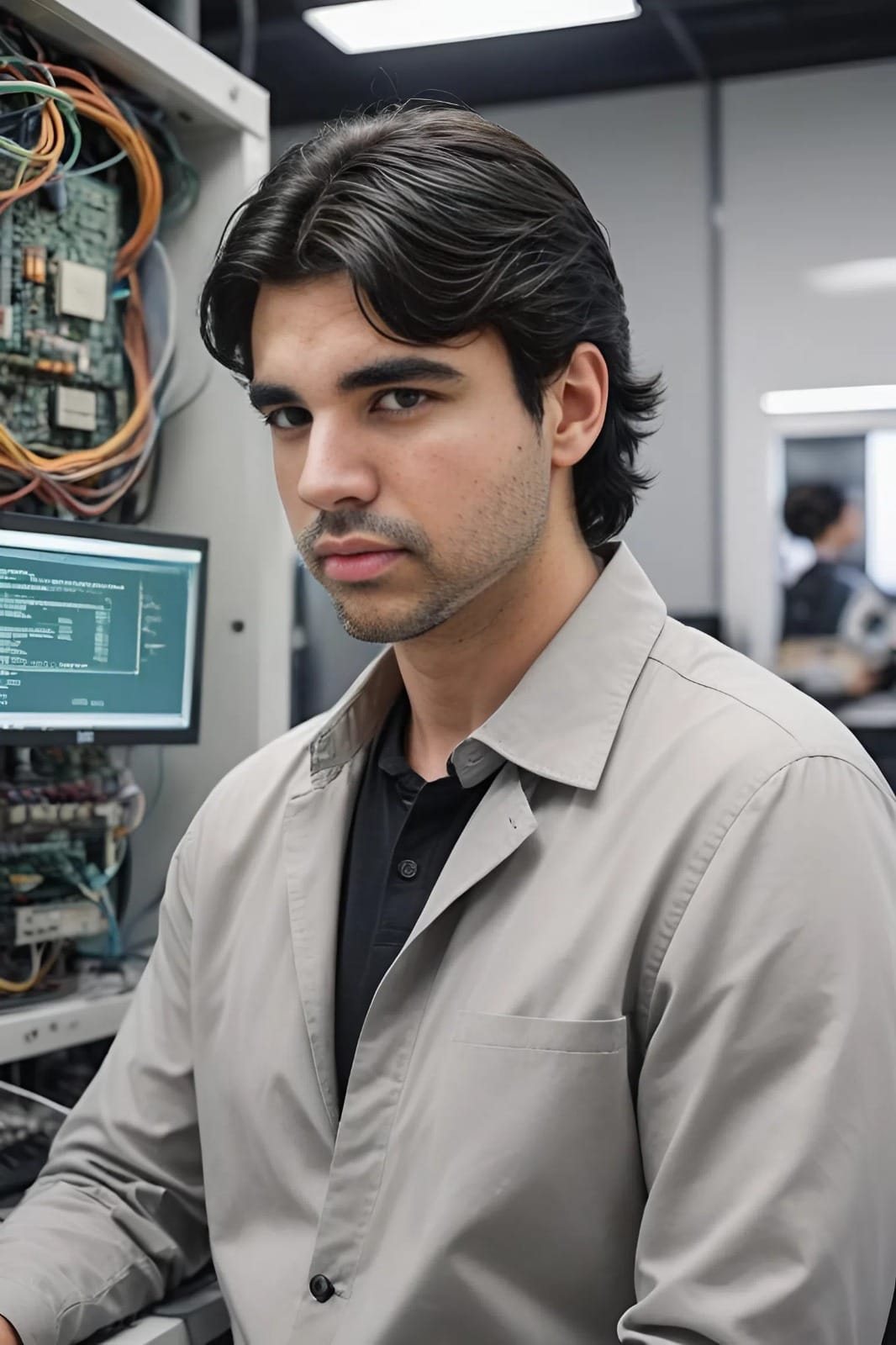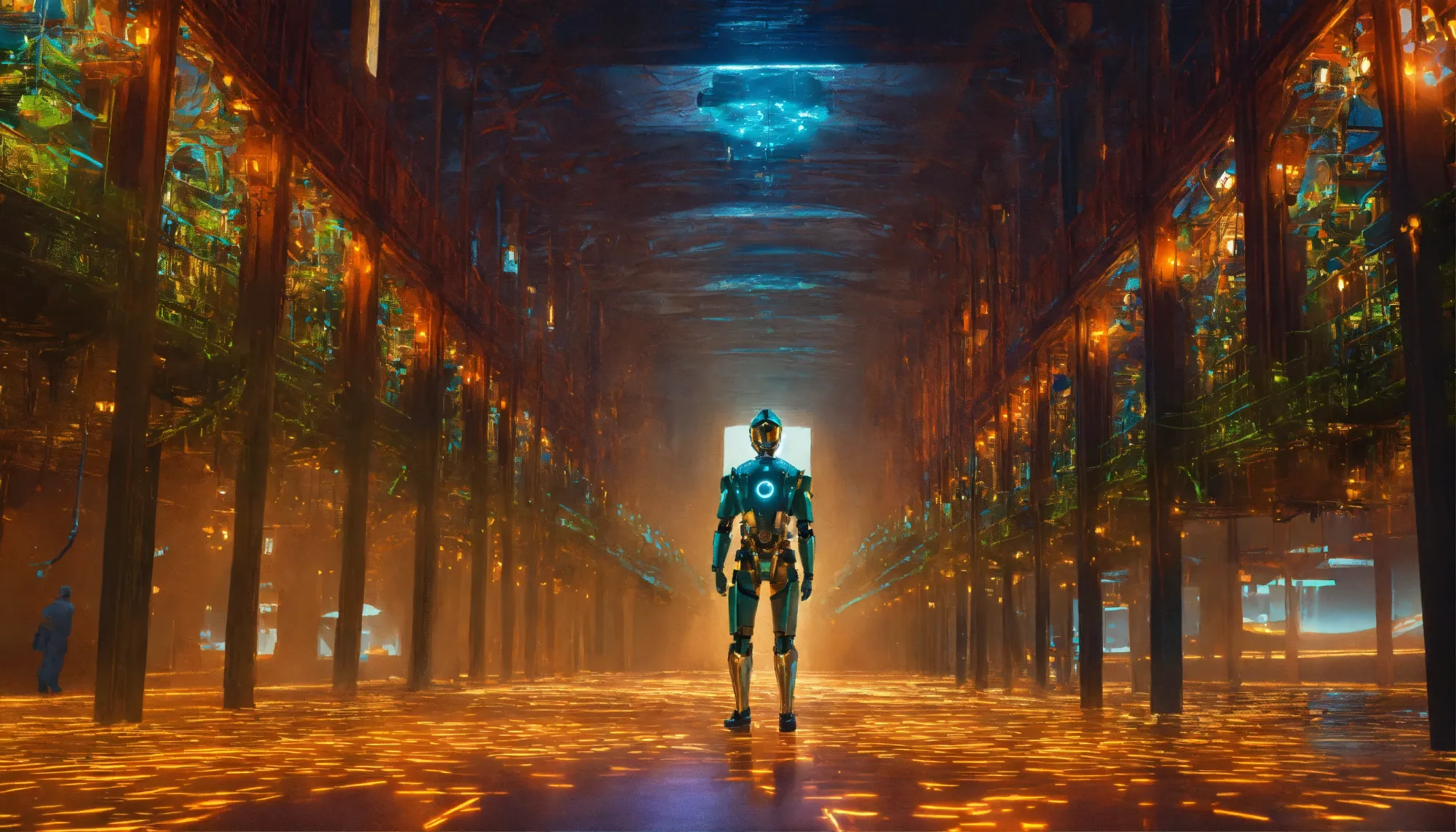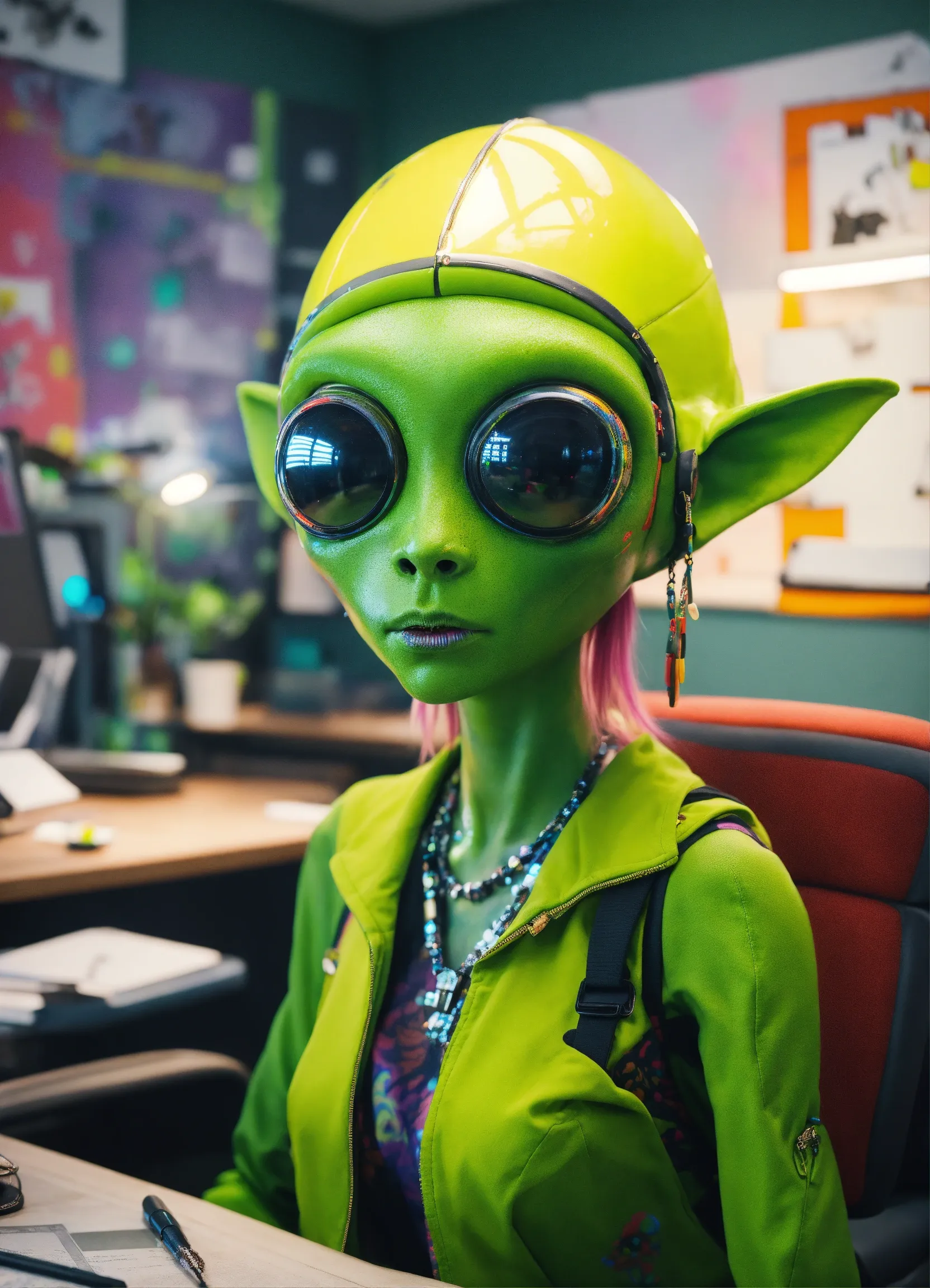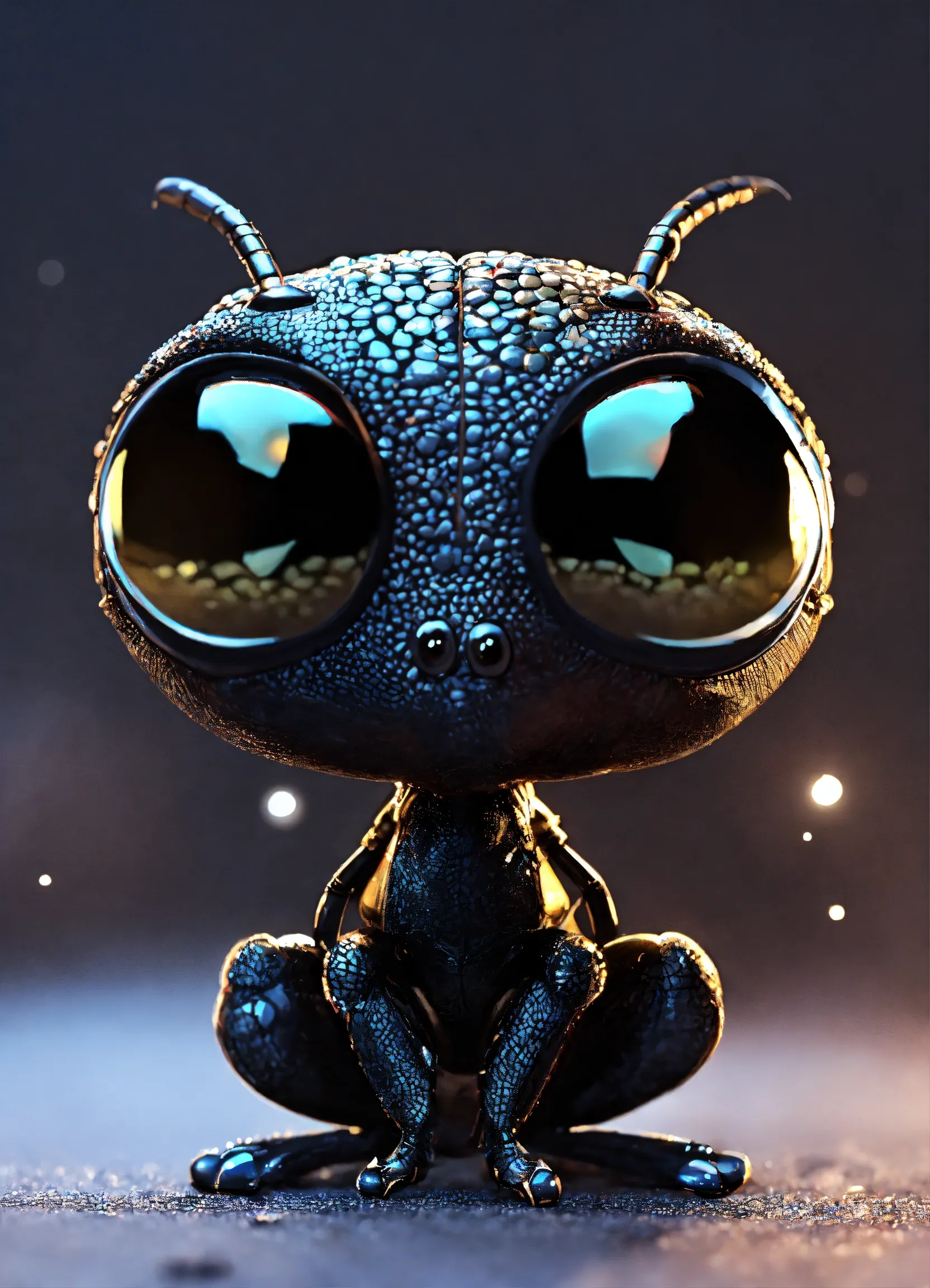The Nose-Man
They laughed at him. They called him the Nose-Man. In a future obsessed with perfection, he was an outcast - until one fiery night gave him the chance to show them all what a true hero looks like. A heartfelt novella in three parts.
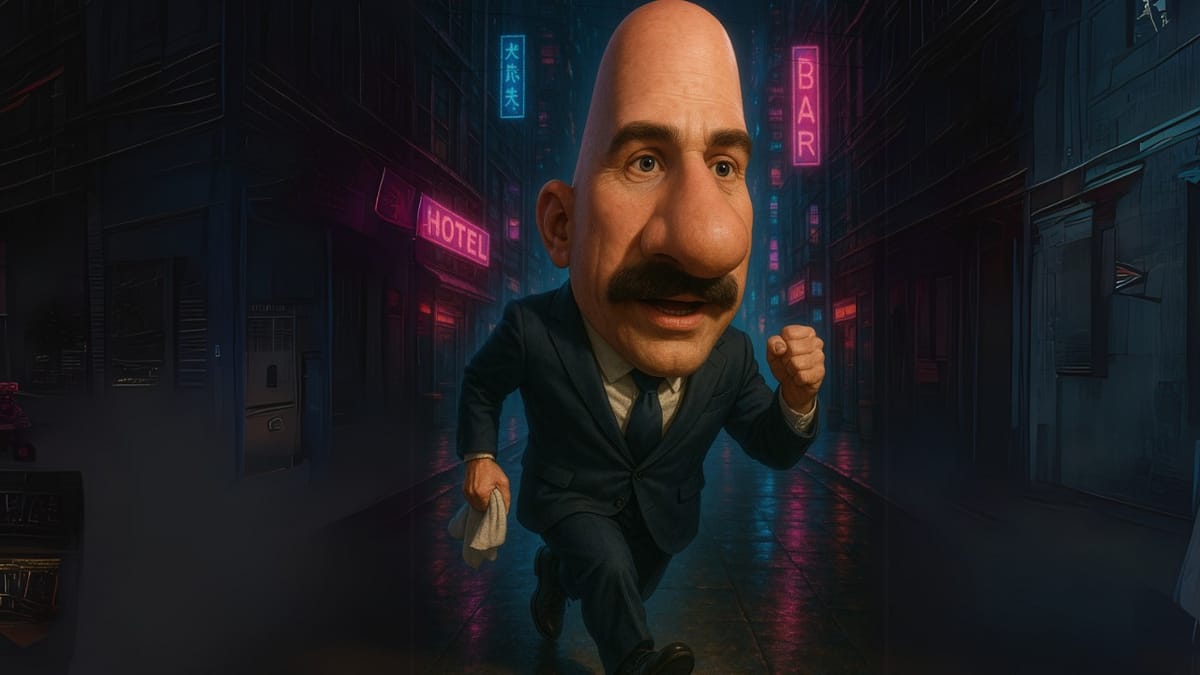
Part 1
Let me tell you something. Two things, actually. One, don't judge a guy by his face. Or, in this case, his nose. Two, even in the year 2800, with flying rickshaws and chai-drones buzzing around your head, some things in India never change. People will still stare. They will still whisper. And they will definitely, one hundred percent, laugh at you if you are different.
My name is Akash, and I’m a pretty regular guy. I work as a 'Dream Weaver' at a company called ImaginCorp. It sounds fancy, I know. My mom tells all her friends in our Vertical Colony, "My Akash is a Dream Weaver! He weaves dreams for the whole of Neo-Delhi!" What I actually do is design the advertising holograms that are projected onto the smog clouds above the city. So, if you see a giant, fifty-foot Amul girl hologram feeding a robot butter, yeah, that was probably me. It pays the bills. Or, as we say in 2800, it keeps my Universal Credit score in the green.
Life is… well, it’s life. I wake up in my 300-square-foot pod-apartment in Sector 52 of Neo-Delhi. I have my nutrient paste for breakfast – today’s flavour was ‘Maa ke haath ka aloo paratha’, which, let me tell you, tastes nothing like the real thing my grand-grandmother’s diary describes. Then I take the Sky-Metro to work, dodging the crazy rick-pilots who think traffic laws are just ‘suggestions’. It's a normal, predictable, and frankly, slightly boring existence.
That is, until I saw him.
The first time I saw the Nose-Man, I actually choked on my synthetic lassi. I was at the ‘Chandni Chowk 2.0’ food plaza, a massive, multi-level dome that tried to replicate the feel of the ancient market with holographic spice stalls and laser-projected pigeons. He was standing in line for a nutrient-dosa.
And guys, I’m not exaggerating. His face… it wasn't a face. It was a nose.
I mean, of course, he had eyes and a mouth. But they were tiny, almost lost in the colossal, fleshy mountain that was his nose. It started from his forehead, swelled out in a great, proud curve that covered where his cheeks should have been, and then tapered down to two nostril-caves just above a small, thin-lipped mouth. It wasn't just big; it was his entire facial geography. If you were to draw a caricature of him, you’d just draw a nose with stick-figure arms and legs.
The guys I was with, fellow Dream Weavers from my office, they saw him too. And of course, they started.
“Oi, look at that,” snickered Sameer, who designs ads for fairness creams that now promise to make your skin ‘glow-in-the-dark’. “His parents must have prayed really hard for a boy with a big… future.”
“He must get great reception on his comm-link with that antenna,” added Priya, pointing with her chin.
I’m not proud of it, but I laughed along. What else could I do? It was funny. The guy looked ridiculous. Like a half-finished Bio-Sculpt project. In an age where you could get a new face, a six-pack, or even cat-like eyes for a few thousand credits, this guy was walking around with… that.
We started calling him the ‘Nose-Man’. It was cruel, I know. But in the sterile, perfectly-sculpted world of 2800, he was an anomaly. An outcast. A joke.
I started seeing him everywhere. On the Sky-Metro, he’d always stand in a corner, even if there were empty seats. He’d hold a data-slate in front of his face, pretending to read, but I could see his small eyes darting around, watching people watch him. At the grocery-bot, people would give him a wide berth, as if his condition was contagious. Kids would point and their mothers would pull them away, whispering, “Don’t stare, beta. It’s rude.” But they stared too. Everyone did.
I found out he lived in my Vertical Colony, just a few floors below me. His name was Rohan. Just Rohan. He worked a menial job, calibrating the atmospheric purifiers on the lower levels. A lonely, thankless job for a lonely, thankless existence.
My life continued. I was trying to work up the courage to ask out my colleague, Anjali. Anjali was… different. She was a Story-Sculptor, creating narratives for virtual reality experiences. She had kind eyes and a smile that wasn't surgically perfected. She had a small scar on her chin from a childhood accident with a hover-scooter. She’d refused to get it removed. "It's part of my story," she'd say.
One evening, we were at a rooftop chai-drone stall, watching the neon lights of Neo-Delhi flicker to life below us. The air was thick with the smell of synthetic ginger and cardamom. It was a perfect moment. I was about to say something charming, something I’d practiced in front of my bathroom mirror-screen.
And then, of course, Rohan walked past.
He was heading home from work, his worn-out technician’s uniform smudged with grease. He walked with his head down, a solitary figure against the dazzling cityscape.
“There goes the Nose-Man,” I said, trying to be funny, trying to break the nervous silence between Anjali and me.
A mistake. A big, fat, stupid mistake.
Anjali didn't laugh. She just watched him until he disappeared into the entrance of our Colony. The drone delivered our chai, humming softly, but the perfect moment was gone. The silence was back, but now it was heavy.
“Why do you call him that?” she asked quietly, not looking at me.
“What? Oh… that. Everyone calls him that. I mean… look at him.”
“I am looking,” she said, her voice barely a whisper. “I see a man who walks home alone every day. I see a man who has to face a world that points and laughs at him, for something he didn't choose. Don't you ever wonder what it's like to be him?”
And just like that, I felt like the smallest, stupidest person on the planet. Here was this girl, this wonderful, kind, amazing girl, and I was trying to impress her by being… a bully. A common, garden-variety jerk.
“Imagine it, Akash,” she continued, finally turning to look at me, her dark eyes searching mine. “Imagine waking up every day, knowing that the first thing anyone will notice about you is what they think is a flaw. Knowing that no one will bother to see the person behind it. That must be… so lonely.”
Her words hit me harder than a rogue rickshaw. Lonely. That was the word. Behind the ridiculous nose, behind the joke, there was just a lonely guy. A guy named Rohan.
I mumbled an apology, something about not thinking, and she just nodded, her disappointment clear. We finished our chai in silence, and the magic of the evening fizzled out like a cheap firework.
Walking home, I saw him again. Rohan. He was standing near the entrance to our building, talking to the Sharma family from the 14th floor. Mr. Sharma, a grumpy old man who was always complaining about the Colony's maintenance fees, was there with his wife and their little six-year-old daughter, Rina. Rina was usually one of the kids who would hide behind her mother's legs when Rohan passed.
But tonight, she had dropped her glowing holo-doll, and it had rolled under a large recycling unit. She was crying. Rohan, bless his heart, had gotten down on his hands and knees, his enormous nose almost scraping the grimy floor, and was trying to reach for it.
He managed to get it and handed it to the little girl. She stopped crying and took it from him, staring at his face with wide, curious eyes. For a moment, she wasn't scared. She was just a kid looking at another person.
Mrs. Sharma gave Rohan a nervous, but genuine, smile. “Thank you so much, beta,” she said.
Mr. Sharma just grunted, grabbed his daughter’s hand, and pulled his family towards the elevator, muttering something about not talking to strangers.
Rohan watched them go, a flicker of something – maybe sadness, maybe resignation – in his small eyes. Then he straightened up, adjusted his worn-out bag on his shoulder, and walked towards the other elevator bay. Alone.
I stood there in the lobby for a long time, the holographic ads for skin-whitening and muscle-enhancement flickering on the walls around me. We lived in a world of curated perfection, a world where anything ‘ugly’ or ‘different’ was meant to be erased. And yet, the kindest, most human act I had seen all day had come from the one person our society had deemed the ugliest.
Anjali’s words echoed in my head. It must be so lonely.
I looked at Rohan's retreating back and for the first time, I didn't see a nose. I saw a man. And I felt a profound, gut-wrenching shame. I promised myself that things had to change. I had to change. Little did I know, it wasn't me who was about to change things. It was the Nose-Man. And he was about to show the whole of Neo-Delhi what it truly meant to be a hero.
Part 2
Feeling like a first-class idiot is a universal feeling, right? It doesn't matter if you live in 2024 or 2800. It's that same stomach-sinking, head-shrinking, ‘I-wish-a-black-hole-would-swallow-me’ feeling. That was my state of mind for the next few days. Anjali’s words had been like a tight slap from my own conscience. “I see a man who has to face a world that points and laughs at him.” And I had been leading the laughter parade.
At work, I tried to avoid Anjali. Not because I was angry, but because I was ashamed. I buried myself in my work, designing a particularly obnoxious hologram for a new brand of ‘Protein-Pani Puri’ that promised ‘Six-pack abs in every bite!’. It was as fake as my recent attempts at being a charming guy. When I did bump into her near the nutrient-paste dispenser, I’d manage a weak, "Hi," and quickly look down at my data-slate, pretending to be incredibly busy with a very important email. Smooth, Akash. Real smooth.
My new-found guilt had one positive side-effect, though. I started observing Rohan. Not as a joke, but as a person. I started noticing things I’d been blind to before. I noticed the way he always carried a real, paper book with him, its pages yellowed and soft – a true antique in our age of data-slates. I noticed that he’d sometimes leave a small packet of biscuits for the stray robo-dog that wandered our Vertical Colony’s lower levels. I noticed that during the morning rush for the Sky-Metro, he would deliberately wait for the most crowded car to pass, so that a family or a group of friends could get on together.
He was quiet, reserved, and seemed determined to take up as little space as possible in a world that already made him feel unwelcome. The cruelty was still there, of course. One afternoon, a group of teenagers on the metro started taking holographic selfies, angling their comm-links so Rohan's face was in the background of their stupid, grinning pictures. They were whispering and laughing, not even trying to hide it. I saw Rohan’s hands clench into fists, his knuckles white. For a second, I thought he was going to say something. I saw a storm gather in his small, deep-set eyes. But then, it passed. He took a deep breath, the sound barely audible, and his shoulders slumped. He just got off at the next stop, even though it wasn't his. He chose to be inconvenienced rather than to cause a scene. He just… absorbed it. Like he always did.
Watching that, something inside me snapped. The next day, I made a decision. I was going to talk to him. Apologize. I didn't know for what, exactly. For laughing at him? For thinking he was a joke? For being a terrible human being? All of the above, I guess.
I waited for him near the elevator bay after work. My heart was thumping like a drum at a Ganpati festival. What would I even say? ‘Hey man, sorry my friends and I are jerks and have been calling you Nose-Man behind your back. My bad.’ Yeah, that would go down well.
He approached, his head down as usual. I stepped forward. "Uh, Rohan?"
He stopped, startled. He looked up, and for the first time, I was face-to-face with him, close enough to see the fine lines of tiredness around his eyes. He was probably my age, maybe thirty, but his eyes looked older.
"Yes?" His voice was a low, slightly raspy baritone. Not what I expected.
"I... uh... I'm Akash. I live on the 18th floor. We live in the same Colony." Lame, Akash, really lame.
He just nodded, his expression unreadable, waiting. The massive nose was just… there. It was impossible to ignore, yet in that moment, I was trying my hardest to look him in the eye.
"I just wanted to say…" I took a breath. "I saw those kids on the metro yesterday. The ones taking pictures. I thought it was… terrible. What they did. I’m sorry you have to go through that."
A flicker of surprise in his eyes. He seemed to be bracing for an insult, not a gesture of solidarity. He gave a small, hesitant shrug. "I'm used to it."
"You shouldn't have to be," I blurted out. "It's not right."
A long, awkward silence followed. The automated lobby cleaner-bot whirred past us, humming a cheerful jingle. Rohan gave me a long, searching look. It was a look that had seen a lifetime of mockery and was trying to figure out if this was just another, more complicated version of it. Finally, he gave a tiny, almost imperceptible nod. "Thank you… Akash," he said, testing my name on his tongue. He then turned and walked towards his elevator without another word.
It wasn't much. But it was a start. It felt like I’d just passed some cosmic test. In fact, I felt so good that I marched right up to the rooftop chai-drone stall, where I knew Anjali would be.
She was there, sketching in a notebook with a real pencil. I walked up to her, my heart still beating fast.
"I spoke to him," I said.
She looked up, surprised. "To who?"
"Rohan. I told him I was sorry about how people treat him."
A slow smile spread across Anjali’s face. It was like the sun breaking through the Neo-Delhi smog. "Really? What did he say?"
"Not much. But he listened. And Anjali… I’m sorry. For what I said the other night. For being one of them. You were right."
She closed her notebook. "It takes a big person to admit they were wrong, Akash." She patted the seat next to her. "Tell me everything."
And so I did. We talked for hours. Not just about Rohan, but about everything. About how our world, for all its technological marvels, was still so backward. We have Bio-Sculpting to make everyone look ‘perfect’, but we don't have a cure for simple cruelty. We have nutrient paste that can replicate any flavour, but we haven't figured out the recipe for basic empathy. It was the best conversation I'd ever had. For the first time, I felt like someone was seeing the person behind my own mask of a slightly-insecure, trying-to-be-cool Dream Weaver.
Life fell into a new rhythm. I’d nod to Rohan in the lobby. He'd nod back. It was our little ritual. A silent acknowledgment. Anjali and I started spending more time together, our bond growing over shared ideals and bad jokes. Things were looking up.
And then, one night, all hell broke loose.
It was late, around 2 a.m. I was in bed, watching a re-run of an ancient show called 'Friends' on my ceiling-projector. Suddenly, a siren started blaring. Not the usual city-wide siren for a smog alert, but a shrill, piercing alarm that I’d never heard before. It was coming from inside our Colony.
My comm-link buzzed. A red alert message flashed across my screen: ‘FIRE DETECTED. SECTOR C. 14TH FLOOR. PLEASE REMAIN IN YOUR APARTMENTS. AUTOMATED SUPPRESSION SYSTEM ACTIVATED.’
The 14th floor. The Sharma’s floor.
I ran to my window. Looking down, I could see it. Smoke. Thick, black, ugly smoke was pouring out of a window on the 14th floor. The automated suppression system, the one Mr. Sharma was always complaining we paid too much for, clearly wasn't working. Instead of fire-dousing foam, there were just more sparks. Little embers were starting to fall, like deadly red snowflakes, onto the balconies below.
Panic started to spread through the Colony's internal network. Messages flew back and forth. ‘The fire is spreading!’ ‘The main corridor sensors have failed!’ ‘Where are the emergency services?’
I could hear faint screams from below. Then, through the smoke, I saw a horrifying sight. Mr. and Mrs. Sharma were at their window, their faces black with soot, their mouths open in silent screams. Behind them, I could just make out the small shape of their daughter, Rina. The flames were visible inside their apartment now, an angry orange beast devouring everything in its path. They were trapped. The fire had blocked their exit.
The whole Colony was watching, a hundred windows filled with helpless faces. The city's emergency response drones were still minutes away, their distant sirens a useless promise. We were all just watching. Powerless.
But one person wasn't.
My eyes scanned the building's facade. And then I saw him. A figure had emerged onto a small maintenance ledge on the 15th floor, just above the Sharma's burning apartment. He was climbing out of a service hatch. It was Rohan.
He had no safety equipment. He was just in his sleep clothes. The wind was whipping around him, and the heat from the fire below was intense, even from where I was watching four floors up. What was he doing? It was suicide.
He stood on the ledge, his strange, large face illuminated by the terrifying orange glow. He looked down at the fire, then at the screaming family. His face, the face that everyone had laughed at, was set with a look of grim determination I had never seen before. He was calculating. Thinking. And while the rest of us just watched, the outcast, the anomaly, the lonely joke of Sector 52, was about to make a choice. The Nose-Man was about to become a hero. And I, along with everyone else in Neo-Delhi, was about to hold my breath.
Part 3
You know that feeling when time slows down? In movies, when a hero does something impossible, they add slow-motion effects and dramatic music. Let me tell you, standing at my window, watching Rohan on that ledge, there was no music. There was only the crackle of the fire, the distant, useless wail of sirens, and the frantic beating of my own heart. But time… time definitely slowed down.
Rohan didn't hesitate. He was a man who had spent his life trying to be invisible, but now, bathed in the terrifying glow of the fire, he was the only person worth seeing. The ledge he was on was narrow, designed for maintenance bots, not humans. Below him, the Sharma’s apartment was an inferno. The heat was so intense it was making the metal of the building groan.
He did something that made my blood run cold. He took off his shirt, the simple cloth he wore to sleep, and began tearing it into strips with his teeth and hands. He then scurried along the ledge to a large pipe – a water conduit for the upper floors – and tied one end of a strip to it, testing the knot with all his weight. It held. He then tied the other strips together, creating a short, makeshift rope.
Down below, at the window, Mr. Sharma saw him. His face, once a mask of grumpy disapproval, was now a canvas of pure, desperate hope. He was shouting something, but the roar of the fire swallowed the words.
Rohan didn't need to hear him. He looped the cloth rope around his arm, took a deep breath that seemed to inflate his whole chest, and leaned off the ledge. For a heart-stopping second, he was just hanging there, silhouetted against the flames. Then he began to lower himself, his bare feet scraping against the hot metal siding of the building, searching for a foothold.
He was aiming for the top of the Sharma’s window frame. It was a crazy, suicidal move. A slip meant a fourteen-story fall onto the hard plasteel pavement. The crowd below, which had now gathered despite the warnings, let out a collective gasp. I saw Anjali at her window on the floor below me, her hands pressed against her mouth, her face pale with horror and awe.
Rohan made it. His feet found the thin ledge above the window. He was now clinging to the face of the building, right above the trapped family. The smoke was thick, black, and choking. And here’s where the cruel joke of his life, his very appearance, played its strange part. That large, protruding nose and heavy brow acted like a small shield, deflecting some of the worst of the rising heat and smoke from his eyes and mouth, allowing him to see, to breathe, where anyone else would have been instantly blinded and overwhelmed. It was a one-in-a-billion chance, a bizarre twist of fate.
"The girl!" he yelled, his voice raw but clear over the din. "Give me the girl!"
Mr. Sharma, weeping openly now, lifted his daughter, Rina. The little girl was terrified, but she reached for the strange man at her window as if he were an angel descending from the heavens. Rohan leaned down, his muscles straining. It looked impossible. The angle was all wrong. But he hooked one arm under the window frame for leverage, his knuckles turning white, and with the other, he grabbed Rina’s small arm.
"Now!" he roared.
With a heave, Mr. Sharma pushed his daughter up and out of the window. For a terrible second, the little girl was suspended over the abyss, held only by Rohan’s grip. He grunted, a primal sound of pure effort, and pulled her up, cradling her small, coughing form against his chest. He had her. He had saved her.
But he wasn't done. He yelled instructions to Mr. and Mrs. Sharma, pointing to the corner of their apartment. They disappeared into the smoke. Rohan, with Rina clinging to him like a limpet, began to climb his makeshift rope, one-handed. It was a superhuman feat of strength. Each pull seemed to take an eternity. I could see the muscles in his back and arms screaming in protest.
He reached the maintenance ledge just as the city’s emergency drones finally arrived, swarming the scene like angry hornets. They immediately began spraying the fire with high-density foam. Below, two drones hovered at the Sharma's window. Mr. and Mrs. Sharma reappeared, having drenched themselves with water from their bathroom pipes as Rohan had instructed. The drone’s robotic arms extended and pulled them to safety.
The crowd erupted in a massive cheer. The sound was deafening, a wave of relief and admiration washing over the Vertical Colony. Rohan had collapsed onto the ledge, shielding the little girl with his body, both of them coughing. A medical drone landed beside them, and paramedics rushed to their side.
I didn’t realize I was crying until Anjali’s hand was on my shoulder. I don’t know when she had come into my apartment. We just stood there, holding each other, watching the man we used to pity being treated like the king of the world.
The aftermath was… insane. By morning, Rohan's face was on every news feed in the Indian Subcontinent. The same face that teenagers had used as a comic background for their selfies was now plastered on giant holoboards with headlines like: ‘THE ANGEL OF SECTOR 52’ and ‘THE MAN WITH THE HEART OF A LION’. They had stopped calling him the Nose-Man. Now, he was ‘Hero Rohan’.
Reporters swarmed our Colony. Sameer, my colleague who had made the first cruel joke, was now telling news channels, "I always knew there was something special about him. A quiet strength, you know?" I almost threw my nutrient paste at the screen. People are so fake.
A few days later, once he was released from the med-bay with minor burns and a clean bill of health, the Colony organized a felicitation ceremony for him. It was awkward. Rohan, dressed in a new formal tunic someone had gifted him, stood on a small stage in the community hall. He looked deeply uncomfortable with the praise, the garlands, and the endless flashes from comm-links.
The highlight of the evening was Mr. Sharma. The grumpy, proud man walked onto the stage, stood in front of Rohan, and simply broke down. He didn't say a word. He just folded his hands, bowed low, and sobbed. Mrs. Sharma led little Rina onto the stage. The girl, no longer scared, ran to Rohan and gave him a tight hug around his legs. She handed him her holo-doll, the one he had rescued from under the recycling unit in what felt like another lifetime.
Rohan looked down at the doll, then at the girl, then at the tearful parents. He awkwardly patted Rina’s head. For the first time, in public, I saw a small, genuine smile on his face. It changed everything. It reached his small eyes, and for a moment, you didn't see the nose. You just saw the warmth.
Later that week, Anjali and I were on our rooftop spot, sipping our chai. We saw Rohan on the terrace of his floor, reading his old paper book. He was alone, but it was a different kind of alone now. It wasn't lonely. It was peaceful. People in the Colony treated him differently, of course. They would greet him with respect. Kids would wave at him. He wasn’t a joke anymore; he was a legend.
"Do you think he's happy?" I asked Anjali, watching him turn a page.
She was quiet for a moment. "I think he was always okay with who he was, Akash," she said softly. "We were the ones who weren't. We needed to see him risk his life to finally see him. His happiness was never dependent on our acceptance."
She was right. What had really changed? Not Rohan. He was the same man who left biscuits for a robo-dog and gave up his seat on the metro. The only thing that had changed was us. Our vision had been corrected.
I raised my cup. "To Hero Rohan," I said.
Anjali smiled and touched her cup to mine. "To Rohan," she corrected me gently.
I looked over at him one last time. The setting sun of Neo-Delhi cast a long shadow behind him. He was just a guy reading a book. A guy who had taught me that it doesn't matter what your face looks like. It matters what you face. He taught me that heroism isn't about having a perfect face, but about having a heart that's in the right place. And in a world obsessed with appearances, a world of Dream Weavers and Story-Sculptors, that was the most real story ever told.

